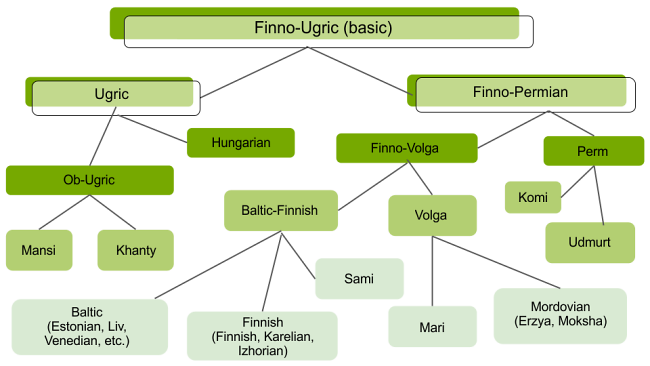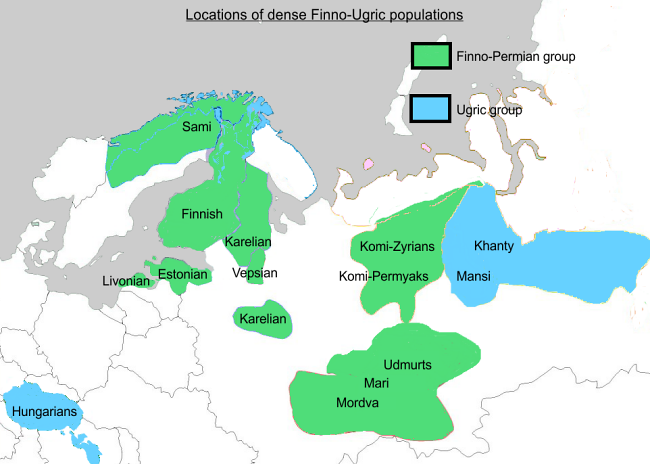
Rapping in an endangered language
Bizzo from Mansi means "strange" in English
Click the CC and choose Russian or English captions from the Settings (cogwheel icon)
ЛИЛЬПИ АМ
Мāнь тāил ам алам капыртасум мори
Таи мāйс ам ля̄льтум нāн сунсыйн, мāньщит, пори.
Ул кантлэ̄н, ат э̄ри, ам мōтхурипай ēмтсум
Манкēм алам э̄ри, такēм ам амким пēнтсум.
Пуӈкум туп та номсас, иӈ ат торъамтасум
Ань пуӈкомпум понсас, мощщак номтыйтасум
Вoссый нэ̄матхуньт мори ам ат капыртэ̄юм
Айтэ̄н āнумн, мāньщит, сōль ам потыртэ̄юм.
Вāйлум, рупатан нāнынн āнумн айтуӈкв
Ос мāныр āнумн вāруӈкв? Хоталь āнумн хāитуӈкв?
Щоровн э̄лаль, ам ēмти тах та порам
Мори капыртанум мāйс суйтититэ Тōрум.
Ущта торъямтилум тах, хумус ōлуӈкв э̄рыс
Мāныр вāруӈкв рōвыс āнумн, мāныр ōс ат э̄рыс,
Элаль ам ат вāйлум ōс, мāныр лāвуӈкв нāнанн
Тāкищ алам э̄сырман нан элы-пāлыт āнумн.
Ат хунтласум ам лāтыӈ, тōнт ōлыс пуӈкум татыл.
Иӈ мощщa номт Ōлыс алам тōнт
Рāхтасум, вāхтасум, āхвтасыт пāхвтасум,
Ōсыватал вāрмальнэ амким нāхвтасум.
Сāюм киврыӈ элумхōлас ōлсум алам пēсум
Лāтыӈ май ат хунтласум нэ̄матхотпа ат э̄рсум
Ань ос торъямтаслум ам, мотщир ōлуӈкв э̄ри,
Мори капыртахтаӈкв воссый нэ̄матхотпа ат э̄ри.
Нāн ос, мāньщит, ам урумтыл, мори ул номсэ̄н!
Ам тах aмким пēнтилум, нāн туп та сунсэ̄н!
Минирищит тāлыт, мōтхурипай ēмтэ̄юм,
Сōль кусэ̄юм лāвуӈкв нāнан, амким ам мощ пēнтэ̄юм
Кāсалылын āнум ётыл, мāнхурипам ōсум
Пуӈкум вотйалан тах, лāвнэ, ёмас пыйрищ ōсын
Ос таӈхēюм лāвуӈкв, мāньщит, пумащипа нāнан!
Мā тарм э̄руптилын,
нāн туп алам āнум!
НОВЫЙ Я
С малых лет я хулиганил,
Из-за этого вы на меня смотрите косо
Не злитесь, не надо, я стал другим
На сколько надо, на столько я поменял себя
Головой тогда не думал, ещё не понимал
Сейчас поумнел, немного поумнел
Больше никогда не буду хулиганить,
Поверьте мне, манси, я правду говорю
Знаю, трудно вам мне поверить
А что ещё делать? Куда мне бежать?
Всё равно скоро настанет такое время,
За моё хулиганство меня осудит Бог
Тогда и пойму, как мне надо было жить,
что мне можно было делать, а что нельзя.
Дальше я не знаю, что ещё вам сказать,
мне очень стыдно перед вами.
Не слушался я тогда, тогда голова моя была пустая,
Ещё мало мозгов было тогда
Я орал, кричал, камни кидал,
во всякие дела себя ввязывал
с гнилым нутром был раньше,
вас никогда не слушался, никто не нужен был мне,
А сейчас понял я, по другому надо жить,
хулиганить больше никогда не надо
Вы манси, про меня плохо не думайте,
Я себя обязательно поменяю, просто за этим наблюдайте
Пройдут года, совсем другим стану
Правда хочу сказать вам, себя очень сильно поменяю
Увидете потом меня, какой я стал,
даже по голове погладите, скажете "хороший парень ты!"
Ещё хочу сказать вам огромное спасибо,
на земле любите
только вы меня!
THE NEW ME
From an early age I was a hooligan,
And you look down at me because of that
Do not be angry, do not, I am now different
As much as necessary, as much as I changed myself
I didn’t think with my head then, I didn’t understand yet
Now I'm smarter, a little wiser
I will never bully again
Trust me Mansi, I'm telling the truth.
I know it's hard for you to believe me.
What else to do? Where should I run?
Anyway, the time will come soon
God will condemn me for my foolishness.
Then I will understand how I had to live,
What I could and shouldn't do.
I don't know what else to say,
I am very ashamed in front of you.
I did not behave, my head was empty,
Didn't have a lot of brain
I screamed, threw stones, and acted out
I got involved in all sorts of things
I was rotten from the inside out,
I never listened to you, I knew it all,
And now I realize, I have to change my ways,
There is no point in being a hoodlum.
You Mansi, don't think bad of me,
I will definitely change myself, you will see
Years will pass, I will become a new me
I am telling you, I will change myself a lot
Then you will see me what I have become,
Even pat me on the head and say "good boy!"
I also want to say heartfelt thank you,
you are the only ones on Earth
that love me!
Author: Evgeniy Anyamov Producer: Árpád Váldazs Music: Igor Sirenko
"Don't blame the people living there!"
December 23, 2021. All rights reserved Komsomolskaya Pravda. Authors Nikolay Varsegov and Natalya Varsegova
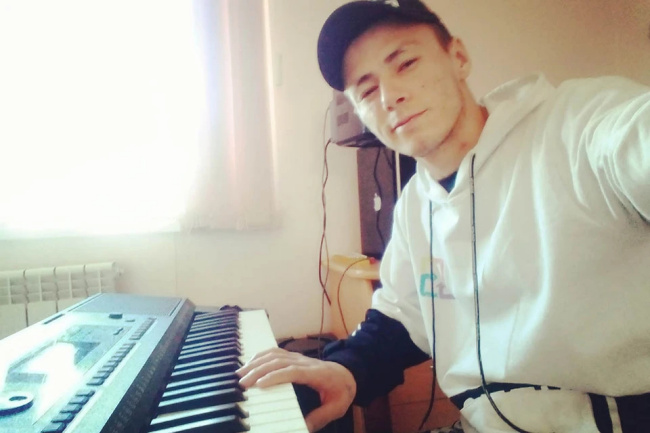
Mansi rapper Bizzo wrote a song about the tragedy in the Northern Urals
We received a message the other day: "Hello! I am Evgeniy Anyamov, the world's first and only Mansi rapper under a stage name. I wrote a song about the death of hikers on the Dyatlov Pass!"
Evgeniy Anyamov is the nephew of our longtime acquaintance Mansi Valeriy Anyamov. Valeriy is well known to our readers as well. He could be seen in various talk shows, where he defended the Mansi people from unfounded accusations of the murder of the group led by Igor Dyatlov, who tragically died in 1959 in the mountains of the Northern Urals. This case remains unsolved to this day.
We share his position. There was not and there still isn't any evidence of the Mansi's involvement in the deaths of the group. There are only different theories and speculations. But none of them hold water. And in general, when someone creates a theory and then twists facts to fit it seems absurd to us.
The rap song performed by Evgeniy Anyamov is also about this. We asked the rapper to translate his song from Mansi into Russian for our readers. Here's the result:
All around in every place and city, every person knows
People died on Kholatchakhl, this much we know,
No one knows what happened there exactly.
Maybe they were scared out there and ran away.
God only knows why they fled their tent,
who scared them so much,
what kind of monster chased them out,
and then drove them down, and killed them there.
But whatever happened, I don't believe they were killed.
I also want to say, that a man couldn't kill them there,
why people say that, I don't understand.
They fled from there in fear, tore up their tent,
for some reason they themselves ran to different places,
their bodies were found far from their place of stay.
If someone wanted to kill them,
then they wouldn't drive them away from where they were sleeping,
leave the bodies where they were killed,
A man there wouldn't frighten anyone,
he would have shoot them, pile the bodies in a heap,
then drag them somewhere else and buried them.
Then join the search and go there again,
go up and down, around or somewhere else entirely.
I don't know what he would have done there then.
If they didn’t find the bodies, they would simply search forever.
Don't blame the people living there!
It's like blaming a birch tree for growing in the wrong place.
I also want to know what kind of horror happened there,
what were they doing there, why they stopped breathing under the snow.
I'm pained, but what can we do?
We can only pray to God that no one else perishes there.
God help us!
Rap buffs will probably not find this song to be exceptional, but that's not what matters. It is important that the artist touched on a sore point for his small northern people. And he tried to defend his ancestors. In addition, he promotes the Mansi culture, which few people know about.
Click the CC and choose Russian or English captions from the Settings (cogwheel icon)
"Next generation will not be able to tell anything about traditions at all"
November 26, 2020. All rights reserved "Ugra news"
The world's first rapper Mansi Evgeniy Anyamov, known under the pseudonym Bizzo, starred in the short film "Dyatlov Pass, hunters for the truth."
The movie closely resembles the series "Dyatlov Pass. A Story That Has Become a Legend", which is now being broadcast on TNT. The film tells about the mysterious death of the hikers from the Dyatlov group. For more than 60 years, more than a hundred versions of the tragedy have been put forward, and an official investigation has been carried out. Most researchers in one way or another touch on the topic of Mansi and their rituals. The sacred mountain and the ban to climb it. In the diaries of students, participants in the hike, there are references to Mansi, notches on trees and other signs.
In the short film, Bizzo performed a rap and talked about the Anyamov family.
– I rap let's go back to the past, we will live a life as we lived before. This is my only nostalgic song. My house is empty, my parents are not there, - says Evgeniy.
The Anyamovs lived in the village of Treskolye, hunted game and fish, adhered to the cultural traditions of their ancestors. His grandfather, Vasiliy Anyamov, wore 23 bear teeth on his belt signfying the number of animals he killed. "My grandmother hunted until she was 50 years old, she had a gun from the 1930s. Before, women shot moose, squirrels and hunted bears."
After a fire in 2005, all residents of the village moved to Ushma, but there are now very few people left even there.
Recalling his childhood, the rapper says that he once participated in a sacrifice ceremony: "They brought a horse from the city and killed it - sacrificed it. I was told in my childhood that if I kill a bear I had to dance on it. I was at the bear celebrations, but don't remember much. Everyone is wearing masks, dancing and singing in the Mansi language... Next generation will not be able to tell anything about traditions at all."
Click the CC and choose Russian or English captions from the Settings (cogwheel icon)
The only rapper who sings in Mansi language is looking for a producer: “Already wrote to Black Star”
Evgeniy Anyamov was born a few kilometers from the Dyatlov Pass in a village cut off from the outside world and now raps all over Russia about his people
January 27, 2022. All rights belong to Komsomolskaya Pravda. Author Danil Svechkov
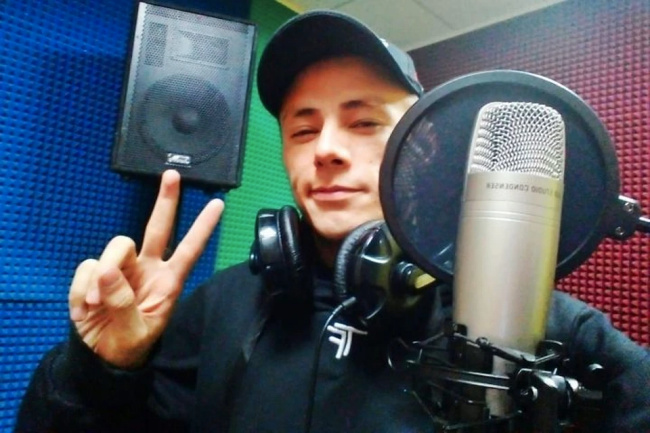
Evgeniy Anyamov is a Mansi himself. He has already written about fifty tracks in the Mansi language. Photo: provided by Evgeniy Anyamov
Standing at the microphone, Evgeniy Anyamov, aka Bizzo, raps in an unfamiliar language. Not Russian words, and certainly not English or French. Even modern translation services are confused. There is no such language in their databases. And all because it is the language of the Mansi people. And Evgeniy Anyamov is the only rapper in the world who can read it.
He already has fifty tracks in Mansi language on various topics. Evgeniy is invited to perform at concerts. His work is of interest to scientists involved in the history of small nations and, of course, those who are interested in the mystery of the Dyatlov Pass, where in 1959 a group of nine hikers died under strange circumstances. After all, it is the Mansi people who live near the Dyatlov Pass and, as some believe, may know a little more than others about what happened in the Northern Ural more than 60 years ago.
Evgeniy Anyamov is a Mansi himself. In December, he recorded the track "Kholat Syakhl", which is dedicated to the death of Igor Dyatlov's hiking group. Komsomolskaya Pravda talked to the rapper, who is gaining popularity, and found out what it was like to grow up next to the Dyatlov Pass and how, thanks to the pandemic, he began to make music.
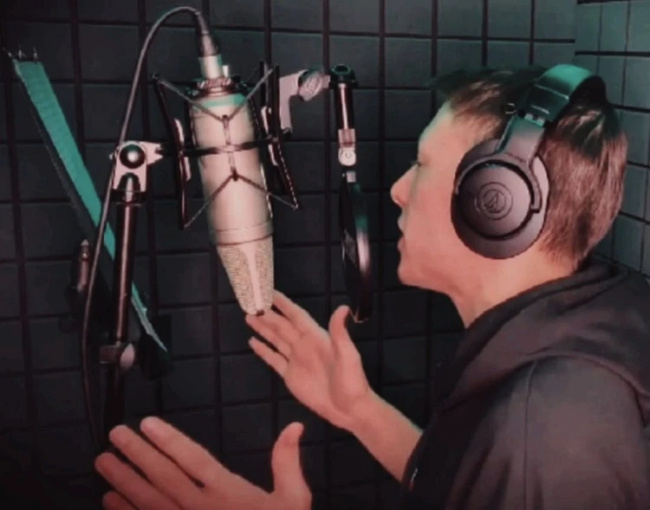
Evgeniy Anyamov dreams of working with the Black Star music label.
- 2 -
Born in a village cut off from the outside world
Evgeniy shows us a photograph from early childhood. On it, a baby looks into the camera, lying in an apa - this is the name of the Mansi cradle made of birch bark. Apa is suspended from a hook on the ceiling. Behind it is a Soviet metal bed with springs, curtains and a window through which one can see Treskolye, the northernmost village in the Sverdlovsk region where the Mansi lived.
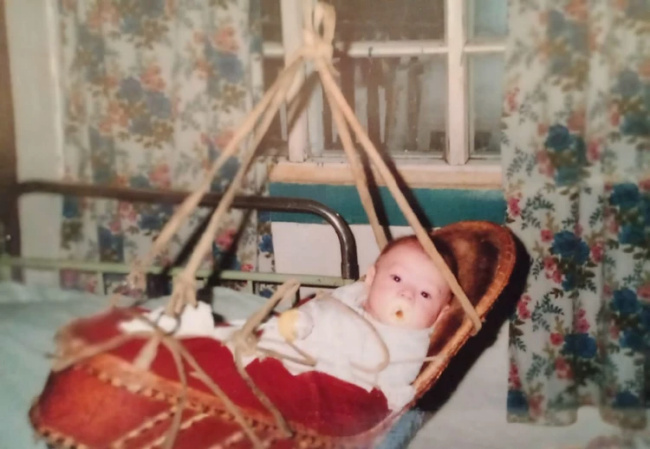
This cradle is called apa. It is made from birch bark. Photo provided by Evgeniy Anyamov
- It was an old Mansi village, - says Evgeniy Anyamov. - Before the fire, which destroyed almost everything, there were ten houses. I was told that I was born right in the bath. My mother had contractions and was taken there.
Communication at Treskolye with the rest of the world was scarce. Mansi lived almost on their own - there were no hikers in the village. Getting to the city was difficult.
- We had one or two snowmobiles for the whole village. The road was such that the UAZ and Niva could not pass. And the Urals and KamAZ trucks could, but they rarely came, - Evgeniy recalls. - It was difficult with the delivery of products. But it was okay. About 40 people lived in the village. Each house had a large family of 5-6 people. We were hunting, collecting berries and nuts. We were gathering roots and plants in the mountains and sold it all in the city. Women sew fur boots. Men hunted. We sold meat, made skis and sold them too.
Beacuse Treskolye was cut off from the outside world by the impenetrable taiga, it was difficult to get medical care. From childhood Evgeniy Anyamov recalls a case when a child in one family fell ill with cough and fever.
- They took her to the city in the winter on a snowmobile. Unfortunately, the girl froze to death, - says Evgeniy. – It was so difficult to get out for treatment.
The fire Evgeniy refers to happened in 2005. Five houses burned down according to him. There were still five left. But the remaining Mansi moved to Ushma - a village 100 kilometers from Ivdel, built especially for the small indigenous population.
- Previously, we had no telephones in Treskolye, there was nothing. And then there [in Ushma] was the Internet, wi-fi. You can call an ambulance and they will come. Here we have a payphone, electricity, - says Evgeniy. - In Treskolye, if someone died, they had to be taken to the city so that all the examinations were carried out there, and then they were taken back to Treskolye to be buried.
My mother was murdered in Ivdel
With the move to Ushma, Evgeniy got the opportunity to listen to tracks of Russian rappers on the Internet.
- We used to transmit music via infrared, via bluetooth then. Ak-47 and Basta were still just taking off. I started listening to them. I listened to Guf, then I heard Eminem. I really liked it, I tried how Eminem reads out. At first I rapped in Russian, then my uncle told me: “Try it in Mansi”. At first I didn't take notice, but then I composed the first track in Mansi - about my parents, about how I was left an orphan.
Evgeniy did not know his father. He left Tresкolye shortly after his birth. Grandma and grandpa died in the fire. And the mother was murdered at the end of 2010 in Ivdel. Evgeniy was then 14 years old.
- I then lived with my aunt and uncle. A rumor reached us from Ivdel about the death of my mother, but at first I did not believe it. And only later, when they brought the coffin, I realized it's all true, recalls Evgeniy. - It all started with the fact that a tick bit my mom in the fall when we went to pick berries. She lost consciousness, we called an ambulance and they took her away. She lay for some time in the hospital, and my aunt and uncle took me to their house. In Ivdel, my mom was staying with friends. And two men walked in. They had an altercation. The hosts stood up for my mother and were killed for that. And mom too. I didn't go into details then. The killers were jailed.
- 3 -
The university was closed due to the pandemic
One day, Evgeniy and a friend decided to shoot a video for one of his tracks in the Mansi language. They posted it on social networks and literally the next day Evgeniy woke up famous. They told about him on a TV channel in Ugra and invited him to perform at a concert in Khanty-Mansiysk.
- I recorded two songs, and decided to stay and study there, - says Evgeniy.
Evgeniy enrolled in civil engineering. He studied for one semester, while working as a correspondent for a local newspaper. And then the coronavirus pandemic began and the university closed doors.
- I then went to Krasnoturinsk to a friend, and then I could not return to Khanty-Mansiysk - two checkpoints were set up on the road, - Evgeniy recalls. - I passed the first one, and on the second one they turned me back. There were Special police unit (ОМОН), traffic police, police, two KamAZ trucks were standing - a medical and police. That's how it all ended. I left work, left school... And started making music.
Evgeniy speaks both Russian and Mansi equally well. He also alternates which one does he think in. But the words for the songs are born initially only in Mansi, and only then he translates them into Russian. Difficulties sometimes arise with this, because not every Mansi word has a direct Russian analogue.
- There are many such words. I get stuck when I write tracks. I had to write to Ushma on Watsapp or Vkontakte to get help translating into Russian, - says Evgeniy.
Although he became popular, Evgeniy still doesn't earn money from his tracks. For example, two short performances of 10 minutes each at concerts in Severouralsk and Khanty-Mansiysk brought him only about 130 USD. At the same time, he has no other job - now he is completely busy creating tracks in the Mansi language. A sponsor helps him.
- He is a historian. Scientist. Studies history of small peoples. Works in Stockholm. Back in Russia, he teaches history to senior students, - explains Evgeniy.
As a child, he saw an UFO
Evgeniy is skeptical about the mystery of the Dyatlov Pass. He says that the mystery of the death of the hikers worries mainly residents of large cities, like Yekaterinburg. Among the Mansi, no one is particularly interested in discussing the topic.
- In Ushma, there is a mountain after mountain. All my life I've lived 50 km (30 miles) from the pass. I can get up with groups and go there. But I don't need it. Haven't I seen mountains? - says Evgeniy. I have never been to the pass and don't plan to. Although, maybe in the summer I will go to shoot a video for the track “Kholat Syakhl”. No one talks about the fact that someone died there. In cities, yes, this topic is in full swing. But we don't discuss it here.
Evgeniy admits that he learned about this story only about three years ago, when the topic began to be discussed a lot, and when Komsomolskaya Pravda and Russia 1 TV channel organized an expedition to the pass.
- Malakhov came to Ushma to us then. Talked to people. I was in the city at that moment, - the rapper recalls.
- And how do you feel about the version that the Mansi may be involved in the death of the hikers at the Dyatlov Pass? - we asked.
- I watched the program "In fact" on Channel 1. Someone said in the program that the Mansi were to blame. That's bullshit! Complete nonsense. Hikers come to us in Ushma. We always help with what we can. Sometimes we will single out a house for them, always helping them with something somewhere. We'll give them food. We still help people. There is no point in doing harm. Moreover, there were generally teenagers, students. Our people would definitely not touch the students. Tourists, apparently, saw a military base somewhere there. Or they found fragments of a rocket, and someone got rid of the witnesses. I saw one thing in Treskolye as a child, like a parachute. Only the parachute flies down, and this one had a canopy flying forward, and some stars sparkled behind. I didn't even understand what it was.
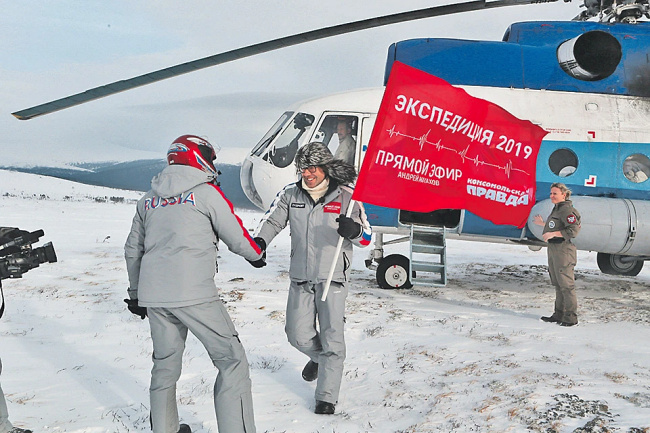
Komsomolskaya Pravda and the Russia 1 TV channel 2019 expedition to the Dyatlov Pass. TV presenter Andrey Malakhov arrived by helicopter. Photo: Evgeniy Sazonov
When we talked with Evgeniy, he was in Ushma visiting relatives. Basically, he lives in Krasnoturinsk with a friend and in Serov, where acquaintances have a recording studio.
- I don't have a place to stay in the city. In Ushma I live in a log house, a hut. But if I live in Ushma all the time, not a single correspondent will get through to me. And in general, there will be no developments, - says Evgeniy. - I'm just now looking for a producer who would work with me. Wrote to Black Star. They have recorded all the popular artists. I really need to completely rewrite all the music. When I write a track, I download music from the Internet. I don't know what the downside is. I recently rewrote one composition myself and even wrote lyrics, but haven’t been to the studio yet, I left for Ushma. If hikers show up, I will go with them to the city and record a track in the studio.
Who are the Mansi anyway?
Short historic overview on the relation between Russians and Mansi people. In 13th century during the Golden Horde (aka Kipchak Khanate), the Mansi raided the Komi and the Stroganovs lands. As a result, Yermak made a retaliatory invasion. When Yermak annexed Siberia, initially the Mansi princes and boyars were accepted into the same rank already as part of Russia. As a result, Ugra began to give furs to the Russians. But the Russians came with vodka, because the drunken Mansi sold their furs for nothing, and as a result, the Mansi began to drink too much, which was one of the main reasons for the decline of the Mansi civilization, and what is happening to this day.
Тhe history of Finno-Ugric activism is not just recent. 100 years ago, there was a rather big breakthrough in Lenin time, literature was published in languages to educate peoples, since not all of them read Russian. With the arrival of Stalin began persecution, languages were gradually banned, the Erzya linguist and scientist Anatoliy Ryabov, the Udmurt scientist Guzebay Gerd and many other activists were shot. The number of the Izhora people in the period from 1926 to 1956 decreased from 16 thousand to 1 thousand, which gives reason to classify this as genocide, and for example, the Crimean Tatars were evicted to Kazakhstan for cooperation with Hitler on the orders of Beria, and many died on the way there. To me is not clear what happened to the Mansi during the repressions, but even before the arrival of Lenin, some Mansi groups were assimilated by Tatars and Russians. In the future, all education was conducted exclusively in Russian. At the same time, children of small nationalities were beaten for using their native language. As a result, many of them stopped speaking the language of their ancestors.
Even in the 90s, schools told parents not to speak their languages to their children, because their "language and culture are inferior". To this day, some Mansi children have to hear from their peers that their people are clowns.
Then, in the 80s, Perestroika began, and on the basis of the collapse of the country, national newspapers began to open, for example, Luima Seripos. In 1991, they adopted a resolution recognizing the actions of the USSR in relation to indigenous peoples as genocide.
However, in the 90s, poverty and rampant banditry rose, and the Chechen war began. Putin ended the Chechen war, and people finally began to have money and at least some prospects. And due to the fact that many, including those from minority peoples, remember the horrors of the 90s, they do not want to return to the 90s, and therefore they are supporters of the ruling regime.
However, now there has again been a tendency towards the unification of all under the Russians. For example, recently the director of the CILT (Center for Innovative Language Technologies) in Komi, which is researching the Komi language, was ordered: “You won’t get any money from Russia, but you can’t get any support from abroad either, because we are at war with them.” As a result, the security forces removed her out of the post of director of the CILT. This is not new. The extremely small people of the Yukaghir tried to assemble a parliament with the obligatory knowledge of Yukagir, but in the end they were run over by the authorities. Also, more and more often, openly chauvinistic phrases are heard from middle-ranking officials. For example, here is what Olga Artemenko, director of the Center for National Educational Problems, said about the Tatar language: “Tatar language [according to the law] is alongside, but unequal,” while making a movement with her palm down. Then, when asked by language activist Vasiliy Haritonov, about the development of the economy in the Tatar language, she said: “Developing the economy in Tatar will lead to... look at Catalonia!” In addition, there is a case with an activist of the Komi people, who began to speak with the judge in Komi, and she said to this that “Didn't you study at a Russian school? Why are making a circus." In addition, people are broadcasting from the central TV channel who openly call for the assimilation of the Finno-Ugric peoples, "because they are no different from Russians". This is not all, the authorities are trying at the state level to force out small languages and infringe on the regions. In particular, amendments to the law on education were adopted not so long ago, where it was said that “you can study languages at will, if there is an opportunity”. As a result, schools have moved the languages of indigenous peoples from mandatory into the category of optional electives, and this is now contributing to the extinction of languages.
The authorities are moving towards “unification of regions”, and trying to unite and melt into one regions that are completely different. From above, for some imperialist reasons, the empowered are trying to redraw the map of Russia, not giving a damn about the people who live there. This is not done just by some politicians who are trying to score points, this is happening in general. To be clear, the minorities have only one party and several satellite parties that exist for the sake of appearance. If a decision is made by the party or put forward by the authorities, then it will be accepted at all times. This is not fair.
This is all happening with the connivance of obedient KGB puppets AFUP (Association of Finno-Ugric Peoples of Russia), according to which the Finno-Ugric peoples are doing so well that they did not send delegates to the congress of Finno-Ugric peoples in Tartu [city in eastern Estonia], saying soemthing in the effect of "you go speak for us with the Russian Finno-Ugric people like our big brothers, we wish to be left alone since we have no problems.” I talked with representatives from government organizations “for the peoples”, who are involved in the distribution of money for various grants. They are promoting the conviction that languages are not needed at all, they will die out, and everyone will become Russian, and therefore there is no need to allocate money for linguistic issues.
In addition, in many regions the economic situation is such that there are no prospects at all. This doesn't apply to Khanty-Mansi Autonomous Okrug. The region is referred to as an oil barrel. It's interesting how the Yamalo-Nenets Autonomous Okrug is said to be a Russian region that allegedly nourished Russia since the beginning of time and that there are some natives jumping with a tambourine, trying to preserve their culture. But since the entire economy of the Khanty-Mansi Autonomous Okrug is focused on oil and there is no diversification, we can't talk about prospects there either. Although it would seem that it's possible to build an aircraft plant there, since predominantly you can’t get there except by helicopter!
Education is extremely compromised in these regions. Due to the lack of a normal education system and prospects, people from there leave for Moscow (population of 20 million), where they are completely assimilated. As a result, mothers do not even dwell on the question “Is it necessary to preserve our native language.” They know: “Native language will not help my son to be admitted the capital's university.” They don't even consider the university of their city, they are that bad.
In addition, many of those who consider themselves in opposition to the authorities prefer to do nothing, but simply talk about politics, neither financially nor in any way helping the development of the Finno-Ugric peoples. And until the last moment they tried to look for a political solution, to go to protests, and, of course, it did not end with anything but detentions. The saddest thing, and at the same time, perhaps, the most salutary thing, is that all the dogs are let loose on these political blowhards, and real activists can calmly go about their business, almost without fear that any pressure will be exerted on them. But so far there are very few such activists.
This has already led to the fact that even now one can very rarely hear indigenous peoples speaking their own language. The number of speakers of local languages is declining at a tremendous pace, and if no measures are taken now, then in 50 years local languages, for example, the Mansi language, will simply cease to exist.
Now the government is giving money to the peoples of the north just because they are the peoples of the north and lead an "indigenous way of life", as a result, according to the 2010 census, we had about 10 thousand Mansi, of which only a little more than 900 spoke the language. But this is extremely a bungled policy of support, saying only that the authorities simply do not know how else to help the indigenous peoples. And this leads to the fact that all these peoples are often dependent, which makes them simply lazy beggars, which is extremely dangerous: when the feeder ends, the consequences can be unpredictable. A more subtle approach is needed, it is necessary to make sure that the Mansi can develop business, medicine, science in their native language, and for good reason, such an approach should have been developed 100 years ago. But since no one really understands why this is necessary, and no one knows how to do sensible work, it turns out that it’s just a swell of huge money into it is not clear what. There is a way to do this, but in principle until now there are still no any books and textbooks on any science in Mansi language, and this is a huge omission. That's the reason even the Mansi don't cling to their language and culture and try to assimilate. I hope that there are activists who can solve this issue.
Everything is deterred by the complete absence of any international support: the Hungarians consider themselves Turks, and they have nothing to do with the Finno-Ugric peoples. They deny the Finno-Ugric theory already almost at the state level, and recently allocated money to scientists to confirm their Turkic identity. The Finns consider the use of the Finnish language to be on the verge of racism and they themselves switch to English en masse, believing that if they speak a language that no one understands, then this is considered indecent on their part. In general, the Finns believe that without the Swedes they are nobody and there is no way to call them. The Finns are also completely unaware that there are other peoples close to them. And Estonia, the only country that wanted to help, was blocked by the Russian authorities, believing that Estonia has no voice at all, and that it can only blindly follow the hand of the US State Department. Accordingly, the Russian Finno-Ugric peoples now have no support at all anywhere, and therefore at the moment we are simply doomed to complete annihilation. They are of no use to anybody.
However, now the regional governments have begun to recognize the ethnotourism as a good prospect. The authorities have already messed up so much that the minimum age when Finno-Ugric people speak their native language is 50 years old. There are only a few of them younger, the younger generation (18-20 years old) does not speak their native languages in principle. That applies to Mansi population too. Almost all young people communicate with each other in Russian, although everyone still understands Mansi. The situation can still be reversed, not all is lost. The main thing is that the authorities don't start repressions again, and at the moment chances for this to happen are very high.
You can discuss this topic on Dyatlov Pass Forum.



